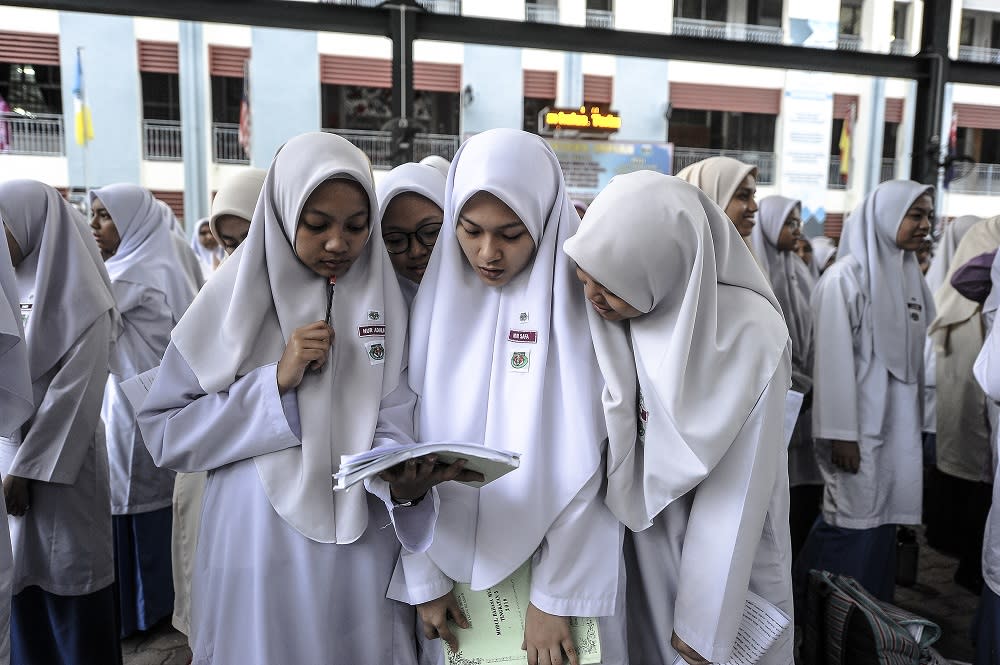Teachers split over streamless system, worry move could hamper industrialisation

KUALA LUMPUR, Oct 16 — Educationists, teachers and parents are divided in their views about the Ministry of Education’s plan to remove the stream system for secondary schools, with one side suggesting it could backfire while proponents of the policy felt it would foster excellence.
For the former, giving students total freedom may spur more to opt for easier subjects in place of science, technology and mathematics, and could potentially impair efforts to catch up with the world and set back the country’s industrialisation drive.
Malaysia is already among the worst performing nations in science and mathematics, two subjects that form the foundation for a skilled workforce, falling behind some of its regional peers like Vietnam and Indonesia in recent years.
“They need to look back at the policy implemented for the last 10 or 20 years, when they started allowing students to choose the subjects they want,” Datuk Lok Yim Pheng, a former teacher and secretary-general of the National Union of the Teaching Profession (NUTP) told Malay Mail.
“And what happened was many students went for the easier subjects instead. Look at what happened then. Now we don’t have enough engineers or scientists.”
Some parents agree. Datin Noor Azimah Abdul Rahim, head of the Parent Action Group for Education Malaysia, cited poor English proficiency among Malay students as a case example in which optional subjects could be detrimental to their own growth.
“Our concern is that students will pick easy-to-get-A subjects with little thought towards what they will pursue at tertiary level,” she said in a text reply to Malay Mail.
“Most have no idea what they will do post-SPM. Therefore a poor choice of subjects such as dropping the English language may thwart their chances of getting good colleges and universities if they are unaware.”
A finding by The National Council for Scientific and Research Development in 2018 said Malaysia needs to have at least 500,000 scientists and engineers by next year to grapple with some of the challenges expected from the rapid disruptions confronting industries.
Yet, official data indicated there are only 70,000 registered engineers currently, just 17 per cent of the targeted amount.
In the 2018 Program for International Student Assessment (PISA) rankings, which scores a country’s performance in science, mathematics and reading, Malaysia failed to make the top 70 in all three fields.
Meanwhile, its neighbour Singapore scored the best on average in all three aspects. Vietnam, whose per capita income is just a fifth of Malaysia’s, was number eight in the science ranking while Indonesia took 63rd spot in the mathematics ranking.
PISA subjects are deemed to be the building blocks for science, technology, engineering, and mathematics (STEM) skills, which experts say are crucial to power a high-technology economy.
But in Malaysia, which has repeatedly expressed desire to become a high-income nation by the next decade, the number of students taking up STEM subjects is on the decline. It plunged to 44 per cent last year from 48 per cent in 2012, according to government data.
Lok, who is also a member of the National Human Rights Commission of Malaysia (Suhakam), said any policy shift must strike a balance that ensures this aspiration is met.
She suggested some sort of quota be imposed for PISA subjects so that schools produce adequate numbers of students equipped with science and mathematics-based foundational skills.
“And they must also have good career counselling,” she added.
“This is important so that students can be correctly guided to choose the right subjects, those that are relevant so that they can get employment, especially in those (high-skilled) fields.
But for those who view the stream system removal positively, the policy is seen as the first crucial step towards rectifying some of the structural weaknesses dogging the public school system.
Harry Tan, the present NUTP secretary general, said that by giving students total freedom to select subjects relevant to their interests, their potential can be fully optimised.
Tan, however, concurred that students would need counselling to help guide them through their choices.
Still, giving students the freedom to chart their own futures would produce far more positive results than sticking to a rigid stream system, since they are more likely to commit to their choices
“As it is, the students are avoiding these subjects in the current system because it is rigid,” he said, referring to STEM.
“For example, students who like languages, social studies, (but) also biology could not be catered to under the old system.”
Secondary school students will have the option to choose which subjects they prefer to study from next year onwards, Education Minister Maszlee Malik reportedly said yesterday.
The move is meant to remove the limitation that prevent students from each stream to pursue the subjects of their interest, which would have not been allowed under the existing system, English daily The Star reported.
Related Articles Maszlee: No more Science vs Arts streams in school starting next year Education Ministry: Treatment of balloon explosion victims priority for now Helium-filled balloons explode at fitness event in Putrajaya, 16 hurt



